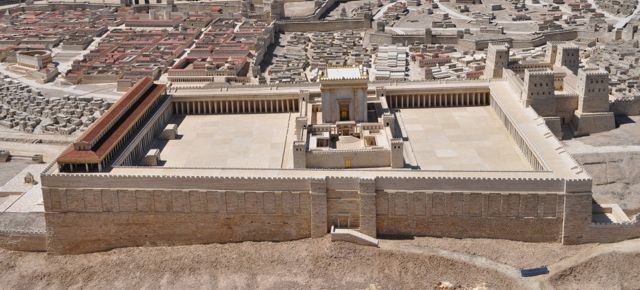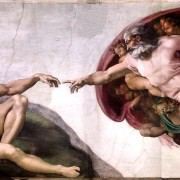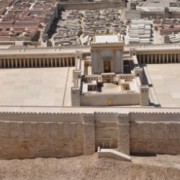The Story of God’s Presence (Part 1)
The Bible is a story, not an encyclopaedia. To find a topic in an encyclopaedia, just turn to the letter “G” to read about God, turn to the letter “M” to learn about Messiah. The Bible doesn’t work this way. By story, I do not mean fiction, but rather an unfolding message. The Bible isn’t about God. It’s about God’s purpose and interaction with people. This grand narrative is a fabric of many threads, but lets look at one of the major threads in the Scriptures – God’s presence.
Now that we’ve threaded the needle, lets follow the stitch in the fabric as we look at Eden, the Tabernacle, the Temple, Jesus, the Church, and the New Jerusalem.
Eden
The Bible begins with an idyllic description of the world we all desire. It’s a place of incomparable beauty, peace, and blessing – the place of God’s presence. God created man to be in relationship with him. In fact, God walked with Adam in Eden (Genesis 3:8). Adam, being in harmony with his Creator, wasn’t laden down with fears; his relationship with his Maker was free from inhibitions. There was no pain or death, simply the joyful pleasure of life lived in God’s presence. Something as wonderful as this ought to be shared, and so God blessed Adam with the joy of extending the Garden through fruitful expansion (Gen 1:26-28). He called Adam to work and keep the Garden (Gen 2:15-17). The very nature of the Garden itself yearned to cover the earth as a river flowed outward from it dividing into four other rivers (Gen 2:5-9). God’s purpose was to multiply this place of his presence throughout the earth.
This wonderful relationship between man and his God is the joyful life that everyone longs for, but like us, Adam began looking for a way to have the fruit of God’s presence without God himself. Adam and his wife ate from the tree that actualized life lived under self-rule. Choosing to distrust God and God’s Word, man could no longer enjoy the very presence of God. Man became an exile, and lest Adam try to re-enter the Garden, the Lord set cherubim, heavenly beings, with a flaming sword to guard the entrance (Gen 3:23-24).
Tent
God’s purposes hadn’t changed. He still wanted his creature to enjoy and know his presence, but sin now stood in the way between God’s blazing glory and man’s now frail existence. Although Eden, the place of God’s presence, was sealed off from people who rejected God’s goodness, God’s mission hadn’t changed. God called a man named Moses to establish a place of God’s presence that people could come near (Exo 25:8-10). God would meet with Moses and speak with him “face to face” in this tent often called the Tent of Meeting (Exo 33:7-11).
But man’s sin still stood in the way. Although Moses was graciously allowed to enter into God’s presence, God’s glory was veiled in a cloud (Exo 34:5). Moses was unable to actually see God. Reminding us of Eden, the tent’s inner chamber, known as the Holy of Holies, was separated by a veil, and on it were embroidered cherubim (Exo 26:31-33), reminding us of the certain death of sinners standing before a holy God. Access was restricted. There was an occasion in which one man could enter into the Holy of Holies. The high priest, on the annual Day of Atonement, was permitted entry after he offered a sin sacrifice for himself (Lev 16:2-3). His entry was granted only to make atonement for the sin of the people. The high priest did this with great fear, fully aware of his own sin. As with Moses, a cloud covered the presence of God to shield the high priest from death.
God created man to enjoy his presence, but the bitter fruit of sin beckons people to rule their own life in opposition to God. The message of this Holy of Holies is that God is still in pursuit of us. In spite of our rejecting him to be self-made gods, our Maker still pursues us. God had Moses make this tent seeking to multiply his divine presence on the earth. Why a tent? A tent is mobile (Exo 40:24-28). God was moving. He was extending his presence.
Temple
Later in Israel’s history, to show the permanence of his presence, a temple was established in Jerusalem, which God called the place of his Name (1Ki 8:29). The Temple was the epicenter from which the message of God’s presence could echo forth throughout the world. The Temple extended the presence of God, which he said would be a place for all nations to communicate with him (Isa 56:7, 1Ki 8:41-43). Like the tent, access into the thirty-foot cube of the Holy of Holies was only permitted on the Day of Atonement and only by the high priest. Sin still prohibited people from being able to enter in and enjoy God’s Eden-like presence.
The people of Israel didn’t keep God’s good Word, even though they had the reminder of God’s presence in temple form. Ultimately, the Babylonians, as a judgment of God on his people, would destroy this Temple (2 Chr 36:18). The article of furniture symbolizing God’s presence (the Ark) would also go missing. The new temple to be built seventy years later would be a ‘presence-less’ shell, housing a hollow Holy of Holies. Had God ceased from his mission? No. God’s mission is still active.
God is at work in the world. His mission of making himself known is always underway. This is what we see God doing in the Old Testament, but it doesn’t end there. The New Testament brings yet more clarity to God’s purpose and presence. We will look at this in my next post.
[1] John 1:16-17 reveals that grace had been given in the giving of the Law of Moses (which include the building plans for the Tent), but when Jesus came, a whole new dimension of grace was given. We have received the grace of God’s presence directly in Jesus, above and beyond the grace of God’s presence in the tent.
[2] Joh 14:16, the word another here means “another of the same kind”.








Thanks, Matt. Toward the end you state that the 2nd temple was ‘presence-less’ because of the absence of the ark. I get what you mean. Do you think that in some other way the Lord’s presence may have graced that place? Through the prayers of priests and people, through the sacrifices, etc. At age 12 Jesus referred to the temple as His Father’s house and again at the cleansings of the temple. Would the Lord have instructed Joshua and Zerubbabel to construct a ‘presence-less’ temple whose latter glory would exceed its former glory? What do you think?
Tim,
Good point. God definitely directed the 2nd Temple’s being built, and the Temple is definitely a symbol of God’s presence as well. My point (which probably wasn’t as clear as it should have been) was the missing ark as a sign of the place of earthly presence shifting. I don’t think the ark’s disappearance was a literal evacuation of God’s presence, rather an indication that God was bringing His presence in a new way on a new level (if that makes sense).
Hi, Matt – thanks for the response. As to your first point, was the Temple only symbolic of God’s presence or was God actually present? As you know, the symbol is not the reality, but points to the reality. Do you think God’s glory was in the second temple? As to your second point I have always thought that the absence of the ark was a literal evacuation of God’s presence – the removal of His glory so that now Ichabod could be written over the temple.
Tim,
Good questions. I know that the second temple was to be built. This seems clear enough from Ezra. There doesn’t seem to be glory falling on the temple as at Solomon’s. Something seems to have changed, but I would imagine people could still meet with God there, albeit maybe in a diminished sense (considering the ark of the presence being gone).
I think the temple was a symbol just as the tabernacle was, but with the coming of Jesus (a new temple), what is shadowed becomes substance.
Whether God’s presence was evacuated at the God-ordained judgement of Babylon or whether this was more an indicator of a fading or changing of how his presence is personified, I don’t know. But there is certainly a strong connection between the ark and God’s presence.
Good questions Tim.
The Bible was written by Disciples inspired by the Holy Spirit. The Bible is the Word of the Almighty God. It is truth and our direction of where things are going. Read it and you will be inspired and the truth will set you free. Thank you Lord for your Word.